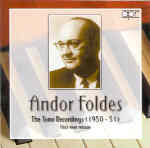Pianist Andor Foldes made a series of recordings for the small Danish Tono label in 1950 and 1951. They appeared on 78 rpm discs just when long playing vinyl records began to dominate the industry, and they’re reissued for the first time here. Foldes’ strong performance of Beethoven’s “Pathetique” sonata easily holds its own with the finest 78 versions (Schnabel, Rubinstein, Fischer, for example). In the central slow movement, Foldes creates more of a polyphonic dimension than many pianists by highlighting the left hand when it comments on the usually dominant right-hand melody. He underlines the outer movements’ inherent drama through subtle rhythmic distensions in transitional sections and sudden surges of energy that propel climaxes to their final destination. These devices, however, nearly undermine the little F-sharp major sonata’s compact unity. Fortunately, Foldes plays the modest G major Op. 79 in a simpler, more direct manner, and his light, offhanded treatment of the scampering finale nearly matches Schnabel’s rascality.
Some listeners will value Foldes’ intimate, carefully detailed Schumann Abegg Variations and Papillons as viable alternatives to the more assertive, dynamically charged Richter references. Foldes rightly builds the Brahms G minor Rhapsody from the bottom up, paying special attention to the bass lines and gathering forward momentum as he progresses. He treats the E-flat Intermezzo in a serious, slightly foursquare manner that I find less convincing next to Schnabel’s brisker lyricism.
Foldes’ tendency to speed up rapid passages in the main body of Chopin’s Op. 34 No. 1 Waltz verges on mannerism. Conversely, his straightforward dispatch of the “Military Polonaise” comes off wooden and unidiomatic next to Rubinstein’s proud swagger. I suspect that Foldes recorded these two Chopin selections more out of obligation than conviction. Although this collection will have limited appeal to general collectors, it certainly should interest specialists wishing to explore Andor Foldes’ artistry beyond his more familiar Bartók recordings for DG.
































